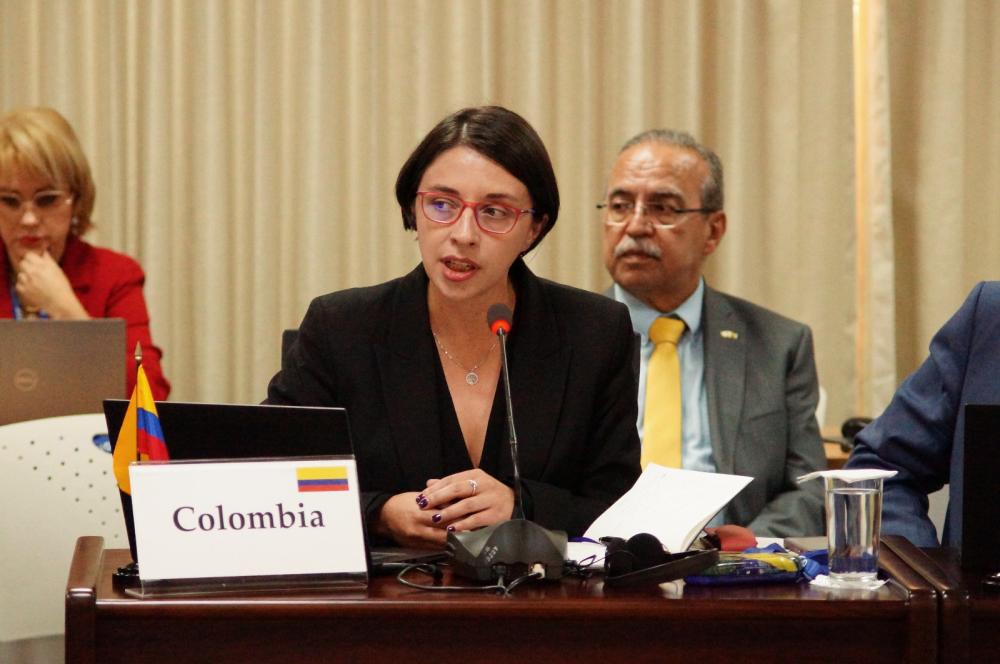The Minister of Agriculture and Rural Development of Colombia, Martha Carvajalino, attended the Executive Committee Meeting of the Inter-American Institute for Cooperation on Agriculture (IICA) in Costa Rica on Tuesday. Eight agricultural ministers and six deputy ministers of the Americas attended the session, where the hemispheric organization announced that it would strengthen technical actions to benefit rural areas, producers and small farmers in the country.

San Jose, 23 July 2024 (MinAgriculture – IICA) – The Minister of Agriculture and Rural Development of Colombia, Martha Carvajalino, attended the Executive Committee Meeting of the Inter-American Institute for Cooperation on Agriculture (IICA) in Costa Rica on Tuesday. Eight agricultural ministers and six deputy ministers of the Americas attended the session, where the hemispheric organization announced that it would strengthen technical actions to benefit rural areas, producers and small farmers in the country.
Minister Carvajalino assured the meeting that, “The Government of Colombia believes in this cooperation, believes that our region should unite to begin the rural transformation process; and the Americas has the power to face this climate crisis”.
In her presentation to the ministers, the senior official of the National Government maintained that, “The region of the Americas can carve out a different path, with the support of an organization like IICA. This solidarity will empower us to improve many areas, such as agricultural extension services and innovation, to strengthen not only our agrifood systems, our sources of life, but the custodians of our water and our forests”.
Furthermore, she explained that Colombia “is seeking to become a Global Powerhouse of Life, a country that will safeguard and protect the heritage of humanity. In this Colombia we would like to introduce Agricultural Reform and Integrated Rural Reform, which will require technical support. We need the solidarity of the entire region of the Americas to makes our rural areas productive, tailored to our unique situation and capable of addressing the climate crisis”.
Carvajalino also stressed that, “We need to support regional and global trade relations. The products of our small farmers, rural communities, indigenous peoples and Afro-descendant communities should have a market value, should be distributed and transformed, generating wealth for these families. This is where the technical cooperation that we are advocating for comes into play; and strengthening our relationship with IICA will play a decisive role in this”.
The head of the agricultural portfolio also indicated that her National Government had suggested the possibility of jointly building this technical cooperation. “The Colombian Government has decisions to make that will require global support and the support of the region of the Americas. In order to change this inequitable land distribution situation in Colombia and to put this land that is not producing food into production for the region and the world, we will require solidarity and the backing of the entire world.
Carvajalino mentioned areas in which Colombia could benefit from international technical cooperation, such as the strategic and global commitment to support the Amazon region. “Today, the Amazon countries and in particular Colombia, are caretakers. We are caretakers of perhaps the most important biome in the world”.
She also referred to areas in which IICA could increase its technical cooperation services to assist the agriculture sector and rural areas of Colombia, highlighting specific topics, such as subsistence farming, family farming, community farming and rural extension services. “This would allow our indigenous and Afro-descendant communities, as well as our subsistence farmers, who are part of our Agricultural Reform, to acquire knowledge, and benefit from technological transformation and innovation, which would enable them not only to adopt better practices, but also to transform their subsistence farming into a major source of food production”, said Carvajalino.
More information:
Institutional Communication Division.
comunicacion.institucional@iica.int











